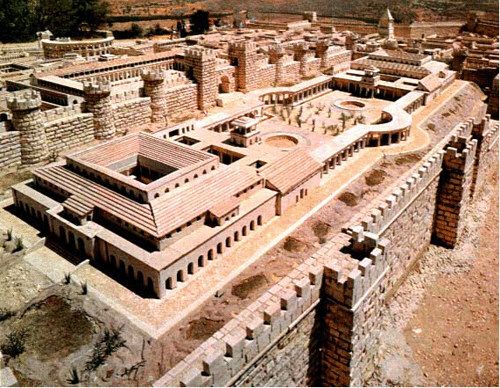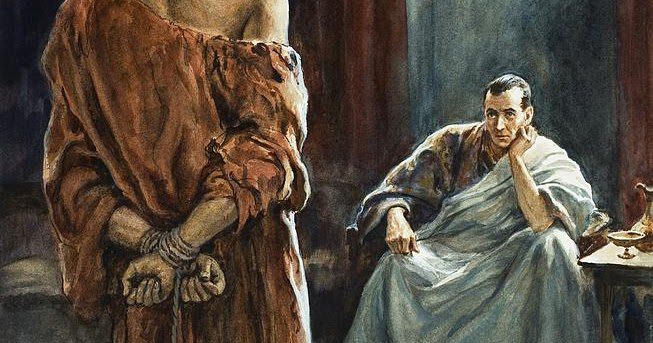Therefore Pilate entered again into the Praetorium, and summoned Jesus and said to Him,
“Are You the King of the Jews?”
John 18:33 NASB
The Politically Charged Question
Pilate interrogates Jesus by beginning privately with a loaded question.
As Governor AND presiding judge (in chambers), the Prefect questions the defendant already declared guilty by the Jews, local leaders who have no authority in this Roman court of Judea.
Pilate’s questions (to which he must have had prepared standard answers to usual responses) went to motive.
- “What is your authority here?”
- “Are you a threat to true authority, which as Governor I represent?”
The Gospels do not record these words, but the timing and context of Jesus’ trial suggests to the Governor that he recognizes a political hot potato in dealing with this popular Rabbi during the religious festival of the Jews in Jerusalem.
For further understanding of Pontius Pilate look back to: 1st century Rome – an awkward embrace of RELIGION & politics
John 18:
Very early that morning:

- As the Jewish officials brought Jesus to the exterior of the Praetorium Pilate came out to them.
- .. and they themselves did not enter into the Praetorium so that they would not be defiled, but might eat the Passover.
29 Therefore Pilate went out to them and said, “What accusation do you bring against this Man?”
They answered and said to him, “If this Man were not an evildoer, we would not have delivered Him to you.”
31 So Pilate said to them, “Take Him yourselves, and judge Him according to your law.”
The Jews said to him, “We are not permitted to put anyone to death..”
Sentenced to death by accusation
We already know of the deceptive stealth of the Temple officials, ceasing Jesus at night then bringing the Messiah of Israel to trial before them.
The Jews really had no authority in Judea and regardless of their predetermined verdict of guilt and sentence of death, Pilate dismisses their case. But now the politics come into play.
These religious emissaries want to execute the man opposed to their religious positions of power, the Man who had ridden victorious into town on a donkey just a few days before, Jesus of Nazareth (a town not even in Pilate’s Judea).
Although we seldom consider the passage of time within a single verse or two of scripture, consider this possibility in the scene about to take place:
- Certainly the Jews with their prisoner Jesus on the outside and Pilate with his advisors inside the Praetorium must ponder what to do next.
- Since Pilate is in charge of Jerusalem and responsible to Rome for any potential trouble, he makes the first move in trying to keep peace between the politics and religion of Jerusalem.
Questions with political consequences
33 Therefore Pilate entered again into the Praetorium, and summoned Jesus and said to Him…
Although the trial of Jesus takes place like all Roman trials in the public square, Pilate begins his questioning of this prisoner of the Jews in private.

“Are You the King of the Jews?”
Are you the King?
Questions with political consequences are best asked first in private. Leaders must know the politically correct answer before asking it in public.
Remember Jesus’ accusers were not present because they would not defile themselves by their self-righteous rule of separation from this gentile Governor responsible for every civic event in Jerusalem. The Jews needed to maintain their white-washed public image before their followers.
- Pilate summoned Jesus to him.
- As a result of his summons the Jews had to release Jesus into the governor’s custody.
βασιλεύς
What is the root meaning of Pilate’s question to Jesus?
βασιλεύς basileús, bas-il-yooce’; probably from G939 (through the notion of a foundation of power); a sovereign (abstractly, relatively, or figuratively):—king.
- leader of the people, prince, commander, lord of the land, king
What are you, Jesus?
(It’s a fair question — to which the Governor would have had a standard reply.
Imagine some of these pre-prepared political answers of Pilate.)
- We have no kings here. You are not a king of Egypt or even Herod who was once king in Jerusalem. Kings do not matter here.
- Our king resides in Rome and I am his governor. What I say comes from our king: Tiberius Caesar.
- Are you a king? It does not matter. Tiberius Caesar is king.
Rather than being led into a conversation about who He is not, Jesus asks the Governor a question.
34 Jesus answered,
“Are you saying this on your own initiative, or did others tell you about Me?”
- Is this really your question
- or did someone tell you that I am a King?
The Governor immediately reminds the accused that in fact he, Pilate, is Roman (and Rome governs Jerusalem).
Pilate answered, “I am not a Jew, am I?
Your own nation and the chief priests delivered You to me;
what have You done?”
John 18:38 NASB
Pilate’s response confirms indictment by the chief priests, but the judge’s question, ‘What have you done?” is opportunity for the defendant to appeal His ill-gotten verdict.
Israel’s Messiah Jesus answers the Governor’s original question about His Authority.
My Kingdom – βασιλεία
Jesus answered, “My kingdom is not of this world.
John 18:36a
The Accused makes no claim to Jerusalem or to Judea or any Syrian territory governed by Pilate.
Rather Jesus claims an authority of the gods (in Pilate’s understanding). In this case:
‘royal power, kingship, dominion, rule, not to be confused with an actual kingdom but rather the right or authority to rule over a kingdom.’ – source: blueletterbible.org
Jesus continues His assurance to Pilate that He is no threat to Rome as other kings and threatening rebels fight to gain influence in places like Jerusalem.
“… If My kingdom were of this world, then My servants would be fighting so that I would not be handed over to the Jews;
but as it is, My kingdom is not of this realm.”
What Realm?
- “..but as it is, My kingdom is not of this realm.” – John 18:36c NASB
- “..but now is my kingdom not from hence.” – John 18:36c KJV
- “..But as it is, my kingdom is not from here.” – John 18:36c CSB
A King must have a country, a realm to rule here and now. Jesus Christ makes no such claim.
The Lord Jesus when brought before Pilate confirms, ‘my kingdom is not from here.”
ἐντεῦθεν
- from this place, hence
- on the one side and on the other, on each side
Luke records an incident from earlier in Jesus ministry describing it with the same Greek word.
Just at that time some Pharisees approached, saying to Him, “Go away, leave here, G1782 for Herod wants to kill You.” – Luke 13:31
Herod, of course, is a pawn not only of Jerusalem’s Jewish politics but also of Rome. Jesus continued at that time to prophesy the events of these three days:
And He [Jesus] said to them [Pharisees who secretly followed Jesus],
“Go and tell that fox [Herod],
‘Behold, I cast out demons and perform cures today and tomorrow, and the third day I reach My goal.’
“Nevertheless I must journey on today and tomorrow and the next day; for it cannot be that a prophet would perish outside of Jerusalem.
Luke 13:32-33 NASB
οὐκοῦν, adverb, not therefore
This is subtle, as well as a function of speech; but don’t miss it.
Several translations of the original Greek from this passage read differently in attempts to convey the argument here of Jesus’ judge Pilate.
37 Therefore Pilate said to Him, “So You are a king?”
(You are a king, but from where {if not here}?)
- .. but it is better to write οὐκοῦν, so that Pilate, arguing from the words of Christ, asks, not without irony, art thou not a king then? or in any case, thou art a king, art thou not? cf. Winer’s Grammar, 512 (477).
- and since a speaker often introduces in this way his own opinion, the particle is used affirmatively, therefore, then, the force of the negative disappearing. Hence, the saying of Pilate οὐκοῦν βασιλεύς εἰ σύ must be taken affirmatively: – Source: Strong’s
To this end was I born
Jesus answered, Thou sayest that I am a king. To this end was I born, and for this cause came I into the world, that I should bear witness unto the truth. Every one that is of the truth heareth my voice.
John 18:37b KJV
In answer to Pilate’s restatement of his own question, “Art thou a king then?” Jesus clearly states His purpose to which He was born as Son of Man and Son of David, the Christ of Hebrew Scripture.
John began his Gospel (Good News) of Jesus Christ stating this same purpose. It really has nothing to do with anything kinglike, as the Jews expected of their Messiah that He would be like King David or King Solomon.
In the beginning was the Word, and the Word was with God, and the Word was God.
And the Word became flesh, and dwelt among us, and we saw His glory, glory as of the only begotten from the Father, full of grace and truth.
John 1:1,14 NASB
Jesus proclaims privately to Pontius Pilate:
“I was born for this, and I have come into the world for this: to testify to the truth… CSB
Pilate is about to ask Jesus the question a Judge must ask himself honestly before concluding a trial, but first Christ continues with purpose for all:
“… Everyone who is of the truth listens to my voice.”
the words of Jesus Christ to Pontius Pilate – John 18:37c CSB
Do you with ears to hear listen to the voice of Christ Jesus?
To be continued...
Page TWO - Please click Page 2 below for the questions.


Leave a Reply